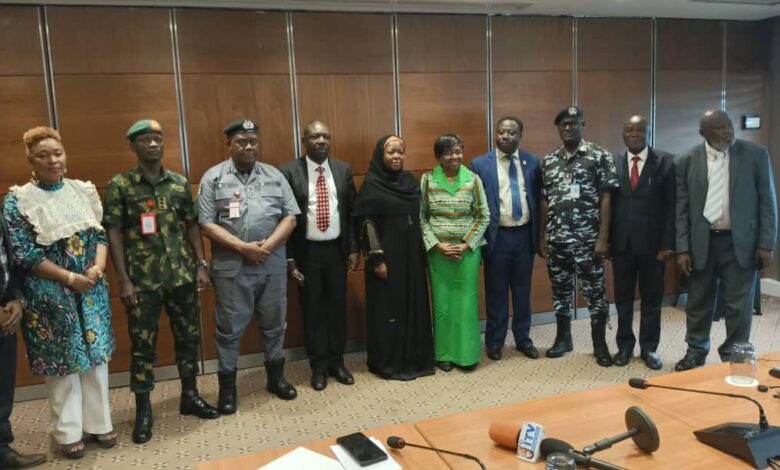FG inaugurates Federal, Zonal Task Forces to combat counterfeit drugs, unsafe processed foods

By: Goodluck E. Adubazi, Abuja.
The Coordinating Minister of Health and Social Welfare, Prof. Muhammad Ali Pate, CON, has officially inaugurated the Federal and Zonal Task Forces against counterfeit and fake drugs, as well as unwholesome processed foods. The move marks a significant step in Nigeria’s ongoing efforts to strengthen public health and safeguard the well-being of its citizens.
Speaking at the launch on Friday, August 8, 2025, at the Transcorp Hilton, Abuja, Prof. Pate emphasized the critical role of strong regulation in ensuring health security, improving population health outcomes, and enhancing Nigeria’s healthcare value chain.
“This is a very important moment in our nation’s efforts to protect the health and safety of our citizens,” the minister said, lauding the National Agency for Food and Drug Administration and Control (NAFDAC) for achieving and maintaining the ML3 designation under the WHO Global Benchmarking Tool, placing Nigeria among the top health regulatory authorities in Africa.

The task forces are designed to work across federal and zonal levels, in collaboration with key agencies, including the Nigeria Police, Nigeria Customs Service, and the Office of the National Security Adviser. According to Prof. Pate, the multi-agency approach reflects the seriousness of the threat posed by counterfeit drugs and unsafe foods.
“Counterfeit medicines endanger lives and undermine trust in the healthcare system,” he warned. “They directly impact health outcomes for diseases like hypertension, diabetes, cancer, and more. If the drugs don’t work, the consequences can be fatal.”
Prof. Pate outlined the alignment of the task force with the four pillars of President Bola Ahmed Tinubu’s health agenda, strengthening governance, improving population health outcomes, unlocking the healthcare value chain, and ensuring health security.
He pointed out that counterfeit drugs and unsafe foods not only threaten lives but also have broader economic implications.
“We cannot afford to delay action,” he said. “We are a country of over 230 million people, and our products also reach neighboring African nations. The stakes are high.”
While commending NAFDAC and its leadership, the minister cautioned against complacency, calling for “zero tolerance for compromise” from all regulatory personnel. He urged vigilance, integrity, and collaboration across all sectors, including the private sector and the public, to ensure the success of the task forces.
“Even if you produce the best quality, your own family may still be exposed to compromised products if others fail to uphold the standard,” he noted. “This fight is personal, and we must all be committed.”
Prof. Pate also indicated plans to scrutinize court processes and other enforcement mechanisms to prevent lapses or collusion in the regulation and prosecution of offenders.
He concluded by expressing confidence that, with continued commitment and collaboration, the newly launched task forces would serve as a formidable instrument in safeguarding public health and restoring trust in Nigeria’s healthcare system.
NAFDAC DG Highlights Progress, Challenges in Fight Against Fake Drugs and Unsafe Foods
The Director-General of the National Agency for Food and Drug Administration and Control (NAFDAC), Prof. Mojisola Christianah Adeyeye, has reaffirmed the agency’s commitment to combating the menace of counterfeit medicines and unwholesome processed foods across Nigeria.
Speaking with journalists shortly after the inauguration of the Federal Task Force on Fake Drugs and Unsafe Foods in Abuja, Prof. Adeyeye disclosed that efforts to intercept and destroy illicit pharmaceutical imports have seen remarkable progress, including the first international destruction of narcotics in 2022.
“Those containers had returned to Nigeria, possibly to disappear again,” she said. “But between 2018 and December 2022, we fought to ensure that didn’t happen. The Republic of Benin finally agreed to release them, and by December 22 or 23, 2022, we conducted the first international destruction of narcotics in the presence of NAFDAC and Customs.”
According to her, NAFDAC now enjoys its strongest-ever strategic partnerships with key agencies, including the Nigeria Customs Service, the Office of the National Security Adviser (NSA), and the National Drug Law Enforcement Agency (NDLEA). However, she emphasized that no nation can win the war against substandard medicines alone.
“It’s a concerted effort. No single country or agency can handle this alone,” she stressed.
Prof. Adeyeye explained that while the Federal Task Force was initially established by government statute in 2004, NAFDAC also runs its own internal Investigation and Enforcement (I\&E) Directorate, which operates separately but cohesively with the task force. Notably, the Director of I\&E also serves as the Chairman of the Federal Task Force to ensure synergy.
“We have a dedicated police squad, about 85 officers, that rotate every six months or one year. They accompany us on raids and investigations,” she said, clarifying that this is part of the task force’s mandate.
On funding, she noted that the task force had never received dedicated financial support in the past, but recent developments offer hope.
“The new Minister of Health was surprised that we had never been funded. He promised to include it in the budget, and we are hopeful that will happen. Everyone now sees the importance of proper funding,” she added.
NAFDAC is also ramping up efforts to proactively monitor the market through post-marketing surveillance. Prof. Adeyeye explained that a risk-based system is in place to prioritize companies that have a history of violations or failed product tests.
“We cannot go after 1,000 products at once. But if a company has been flagged before, we place them under high-risk surveillance. If their products fail testing, we evacuate them from the market and continue to monitor the company’s other products.”
NAFDAC’s internal structure is also being strengthened for better market control, with five key directorates, Drug Evaluation and Research, Registration, Inspection and Clinical Trials, Post-Marketing Surveillance, and Laboratory Services, now working more cohesively.
The DG also praised the agency’s collaboration with the Pharmacists Council of Nigeria (PCN), describing it as critical, especially at the grassroots level where patent medicine vendors operate.
“PCN is everywhere, even in villages. Their pharmacists and inspectors are our eyes on the ground. The synergy with our stakeholders has never been stronger,” she noted.
Beyond regulatory duties, Prof. Adeyeye highlighted the broader societal impact of counterfeit drugs and toxic food products, pointing to risks such as drug-induced accidents, altered mental states, and even increased criminality.
“This is about all of us. Anyone can be a victim. People don’t wait till they’re sick to buy medicine — they rush to get whatever is available, not knowing the dangers. This goes beyond regulation; it’s about public safety.”
On the legal challenges ahead, the NAFDAC boss expressed confidence that with proper legal backing, the agency is prepared to face any litigation that may arise in the course of enforcement.
“If we are backed by a solid legal framework, our lawyers will handle the rest,” she said firmly.
Prof. Adeyeye concluded by thanking stakeholders and partners who have stood by the agency in its ongoing efforts to clean up Nigeria’s drug and food markets.
Federal Task Force on Fake Drugs and Unsafe Foods to Operate with Nationwide Mandate –Dr. Iluyomade
Dr. Martins Iluyomade, Director of Enforcement and Investigations at NAFDAC and Chairman of the newly inaugurated Federal Enforcement Task Force, has stated that the task force has an exclusive federal mandate to regulate food and medicines across the country.
Speaking in an interview following the official launch in Abuja, Dr. Iluyomade emphasized that the task force operates strictly under federal legislation and overrides any similar bodies operating at other levels of government.
“Let me make it abundantly clear, this task force is established under the authority of the federal government, and it supersedes any other task force in Nigeria with regard to the regulation of food and medicines,” he said.
The task force’s primary goal, according to Dr. Iluyomade, is to drastically reduce the presence of fake, substandard, or unwholesome food and medicines across Nigeria.
“We want Nigerians to be confident that whatever they consume or use will be safe, beneficial, and not harmful. One of the reasons for low life expectancy in our country is poor access to quality medicine — this task force aims to address that head-on,” he explained.
The chairman stressed that the task force’s activities will be guided strictly by law to prevent abuse or overreach.
“We’re going to stick strictly to the provisions of the law — not beyond it, not below it. Every action we take must be legally grounded,” he added.
To ensure national impact, Dr. Iluyomade confirmed that state-level task forces were also inaugurated alongside the federal body.
“Every activity of the state task forces must be approved by the federal task force. We are building a coordinated system that allows us to act simultaneously across various locations, with synergy and structure,” he said.
Dr. Iluyomade concluded by reiterating the federal government’s commitment to improving public health outcomes through the removal of counterfeit and dangerous products from circulation.




